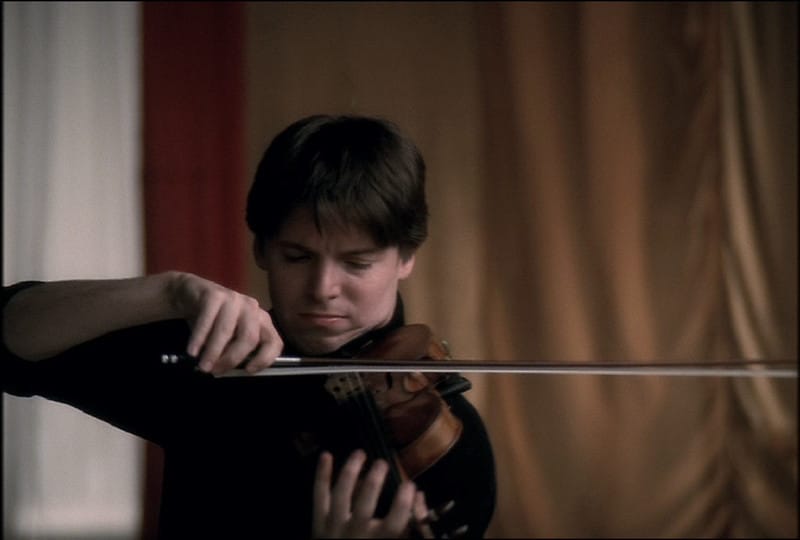By Barbara Khristi
This essay originally appeared in The Strad, and has been lightly edited from the original.
“Every performance is a monument to a person whose voice cannot be heard anymore.”
— Amnon Weinstein
The internationally renowned exhibition, Violins of Hope, came to Pittsburgh, Pennsylvania, four years after it was booked in Arizona. Throughout the fifty days of its residency, Pittsburgh was treated to quite an extraordinary series of events and performances, even as the dates themselves held weighty significance.
Opening day was October 7th, 2023 — the very day Hamas attacked Israel’s citizens in the worst attack on the Jewish world since the Holocaust. We launched the show of violin witnesses that tell their stories. And the show’s run ended on October 27th, the fifth anniversary of the massacre at the Tree of Life Synagogue only a mile from the plinths of the exhibition. The capstone of the exhibition was a special tribute performed by virtuoso Joshua Bell on the Gibson ex Huberman Stradivarius violin; I listened with my heart full on Thanksgiving weekend at the end of November, as the whole of the USA celebrated what there is to be thankful for now.
Sixty-eight events held over fifty days drew people beyond the violins in museum displays at Carnegie Mellon University. Each one that I attended was incredibly meaningful as I listened to musicians performing on the restored instruments (violins, a viola, and a cello). Yet a deep counterpoint intensified my understanding of a macabre history that colored each event.
One of the first events was at Temple Emanuel. String players from the Pittsburgh Symphony Orchestra joined rabbis and cantors to present a one-of-a-kind program: a story from Grymes’ book (Violins of Hope) followed by pieces directly relating to the Holocaust. Then another set of story and pieces, and another. I found myself closing my eyes to try to appreciate that these were the same voices that sang and sighed during the Holocaust.
Concerts around southwestern Pennsylvania went far and wide from West Virginia to Penn State University nearly 160 miles away. Art, photography, ballet, Klezmer bands, educators, and speakers enriched the whole experience.
A ballet performance outside a downtown university was well attended. We followed the dancers inside to a staged performance where they depicted a family interrupted during a meal by a military officer telling them they had to leave. I wept as I watched them forced to leave their homes, board box cars, and ultimately march into gas chambers as the young dancers effectively portrayed their unassailable anguish.
An informal recital in the Carnegie Library, surrounded by books, shared the experience of playing The Flower Violin, named after the flower secured in a tiny glass vial inside of the once-buried instrument. We were told the story of that violin and why it had been buried.
A moment unequaled by any memorial I ever attended came at the end, on the anniversary of the Tree of Life masacre. Set in Pittsburgh’s flagship park in the city’s heart, the memorial included speakers from illustrious clergy of all faiths, the survivors of those who were lost, political dignitaries including Pennsylvania Governor Josh Shapiro and the Pittsburgh Mayor Ed Gainey, and a quartet performance playing on the instruments of the Violins of Hope. On that cool, calm day in a clearing surrounded by woods, I closed my eyes again for my imagination to work freely.
Another event at Chatham University was a unique look into exquisite and even mind-blowing music by composers who were persecuted or perished in the Nazi era. It accompanied an interlude during which played an outstanding film done at Auschwitz (by a Pittsburgh Symphony cellist). These musicians continue to play more of these compositions that were almost lost forever. They defied history when they performed the music at the notorious camp some years ago.
Passionately carrying forth remembrance of the horrors and the lessons of the Holocaust, as well as those of our generation, other programs were curated for children of school age. Some of these were at libraries as well as concert halls. As a docent for the violins, I was moved each time that I guided a tour of young people past their museum display cases. The children were moved also, showing reverence at the stories that brought tears to even adults.
On the closing day of the exhibition, I gave the last tour. And as we concluded, the sound of a violin filled the hall. A Carnegie Mellon University graduate student played Bach’s sonatas and partitas on the Flower Violin. The amplifying acoustics of a museum hall are known to many of us, proving the beauty of the violin in a way that will be forever memorable.
Lastly, it was left to hear Joshua Bell with the Pittsburgh Symphony. He played the Strad that lived through the Holocaust in the hands of Bronislaw Huberman (Huberman and William Steinberg were the founders of the Palestine Symphony, now known as the Israel Philharmonic, saving 1,000 musicians and their families between 1935 and 1939 with their vision and perseverance). He performed the Mendelssohn Concerto, which would have been an act of defiance when Jewish composers were shunned. The instrument survived. The music survived.
Violins have been witnesses to human history; for some who played it was the last thing they did. Sometimes it was the last thing they heard as they marched off to their deaths. Stories in the book, Violins of Hope by James Grymes, provide ample evidence of this. Music and the musicians who create it should inspire us to counter hatred in all its guises and wherever it is found.
Barbara Khristi is a retired violinist/violist, a writer and teacher living in Pittsburgh. Her most inspiring experience in the last 20 years has been an association with the Violins of Hope.


